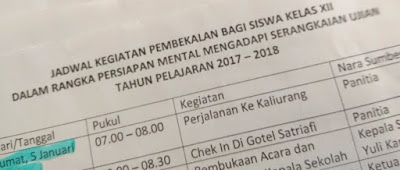Effective
Time Management
Ready for Final Exam
Exam is one process
leading up to a higher stage. Each exam has a different level of
difficulty. Final exams enacted at elementary, junior and senior high schools
are expected to produce qualified graduates. In the process of preparing for
the exam, there are several parties responsible for it, covering teachers at schools,
students and parents. Schools usually make additional hours of study,
private lessons and debriefing students. It is not obligated whether students
take private lessons outside school.
One of the activities undertaken
by SMK BOKPRI 2 was preparing students of XII Class for Examination in the Year
2017 – 2018. The activity was held on Friday until Saturday, 5-6 January 2018
at Hotel Satriafi, Kaliurang, Sleman. “The purpose of the school to
organize this activity is to prepare them mentally in the upcoming exam, to
know the extent of the readiness of their students both subjects and mental to
face the National Examination. It also has an additional purpose to invite them
to relax and not to be awkward facing the test”, said Dra. Rusmiyati the
chairman of the committee.
 There were thirty-three
students and five teachers following the briefing that was split into several
sessions. Stube-HEMAT Yogyakarta, as a student and youth facilitator was
invited to be one of facilitators. Stube sent Trustha Rembaka and Sarloce Apang
to guide the session on Friday, January 5, 2018.
There were thirty-three
students and five teachers following the briefing that was split into several
sessions. Stube-HEMAT Yogyakarta, as a student and youth facilitator was
invited to be one of facilitators. Stube sent Trustha Rembaka and Sarloce Apang
to guide the session on Friday, January 5, 2018.
Sarloce Apang explained
about Stube-HEMAT and it’s activities. While Trustha described the Key of
Successful Exam: Intelligent Time Management. He started the session by guiding
participants to write their activities since morning till night on a piece of
paper. Next, Sarloce chose some participants to read their activities in a
day. Julian, who majored in Culinary
told, “I always wake up early at 06.00 A.M, then I prepare to school. After
school at around 3 P.M, I go home, take a bath and shower, watch movies, play
with mobile phone until 22.15, and then go to bed”.
Anggi, a student studying
Patiseri (flour making product) told that she always wakes up at 6 A.M and has
shower, goes to school, comes home, takes a nap, wakes up and does shower, has
dinner, plays mobile phone and sleeps at 11 P.M. Another student, called Novi
studying House Keeping told that she wakes up earlier than the previous
participants, then gets ready to go to school, comes home from school, has
lunch, has shower, and has dinner and sleeps at 9 P.M. From the participants’
description, it can be known how they manage their available time. Apparently
they have not used their time effectively and still spent much time for
watching television and playing mobile phone, even not learning at all.
Trustha exposed the time
of 24 hours a day into three parts, 8 hours for sleeping, 9 hours for school
and 7 other hours to be used for good one. He invited participants to
spend 7 hours for effective activities by considering which one is important
and urgent, important but not urgent, not important but urgent and not
important but not urgent. Each participant began to sort out which
activities should be taken into priority and which ones should be
ignored. The rest of study time to the exam is so limited, it means that
the remaining time should be used as well as possible.
 At the end of the session
participants were divided into eleven groups. They talked and shared what challenging
subjects for them in the exam. Most students expressed difficulties in
Mathematics and English. Mathematics is still difficult to understand
because the method of teaching is difficult to be understood. In the
sharing time, the participants were more open and talked enthusiastically, even
their teachers were involved in the conversation.
At the end of the session
participants were divided into eleven groups. They talked and shared what challenging
subjects for them in the exam. Most students expressed difficulties in
Mathematics and English. Mathematics is still difficult to understand
because the method of teaching is difficult to be understood. In the
sharing time, the participants were more open and talked enthusiastically, even
their teachers were involved in the conversation. Trustha reiterated that a
wish will come true if there is an action and sincerity to live it. So, from
now, use the available study time before exam as well as they can. A big hope
that all students can be ready for the exam, can do the exam well, and can pass
it together. The session was closed by having a photo
together. (SAP).
Trustha reiterated that a
wish will come true if there is an action and sincerity to live it. So, from
now, use the available study time before exam as well as they can. A big hope
that all students can be ready for the exam, can do the exam well, and can pass
it together. The session was closed by having a photo
together. (SAP).







Comments
Post a Comment